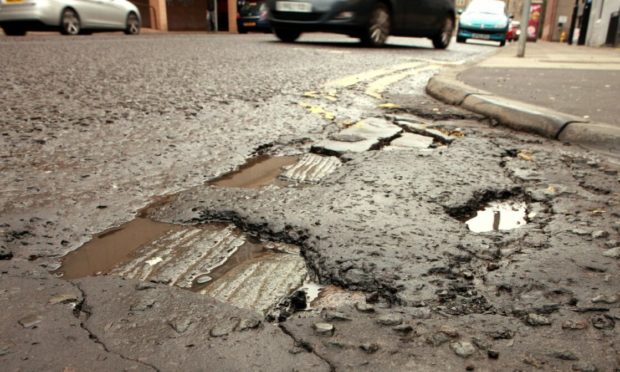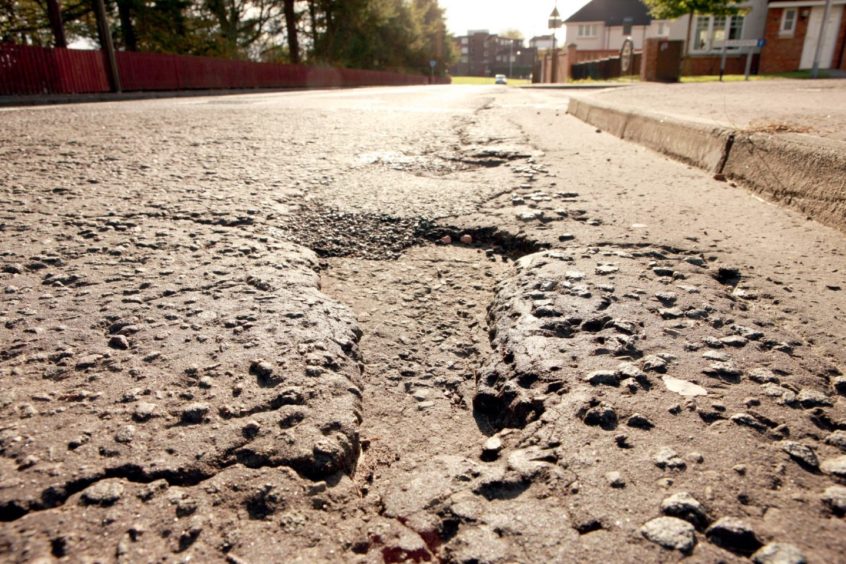Dundee City Council maintains it is one of Scotland’s top local authorities when it comes to fixing potholes.
It says it prioritises permanent repairs over reactive, temporary patching of road defects.
But a slump in spending in previous years has left a pothole legacy across the city’s roads.

In the last of our four part Counting the Cost of Potholes series, we look at how Dundee City Council is trying to catch up with its backlog of repairs.
Spending slashed by nearly 50%
Dundee City Council’s roads spending plummeted by 48% between 2010/11 and 2016/17, from £19m to £10m.
Pockmarked roads and deteriorating driving conditions were the result.
Figures released to The Courier and The Evening Telegraph revealed that in 2018 Dundee had the fourth worst pothole problem in Scotland.
The statistics suggested that you would expect to meet a pothole every 1.2 miles if you were driving in the city.
Dundee roads are managed by the Road Maintenance Partnership (RMP) – an agreement between Dundee City Council and Tayside Contracts.
Earlier this year, a report to the RMP board stated that road defects increase by 27% between 2018-19 and 2019-20.
The increase was down to cuts in spending “beginning to take effect on the network”.
Could investment in planned maintenance be the answer?
Since then the council has put more money into planned patching projects.
Meanwhile, spending on reactive work decreased.
A spokesperson for Dundee City Council said the city was in Scotland’s top 25% for the condition of its roads.
They said: “Dundee City Council recognises the value of investing in permanent renewal work over reactive road repairs and has prioritised the delivery of preventative maintenance treatments to extend road asset residual life before the onset of structural failures.
“Dundee has maintained a steady state in road asset condition over the last 10 years, as measured by the annual Scottish road maintenance condition survey and is in the top quartile nationally for local authority road condition.”
‘Very quick’ response to road hazards
Dundee Conservative group leader Councillor Derek Scott says the recent increases in spending are not enough.
“Total expenditure on roads has decreased in real terms over the last decade,” he said.
“In the last few years when the council has met to set its budget, my group has put forward affordable alternative proposals that would have allowed additional capital funding to be spent on carriageway resurfacing.
“But on each occasion our proposals weren’t accepted by the administration.”
Mr Scott says residents “frequently” raise issues relating to the conditions of local roads.
And praised the RMP teams for their quick response times.
He added: “The Road Maintenance Partnership responds very quickly to the locations I highlight, and deals with any actionable defects and hazards.
“But it really needs additional funding to be able to carry out more permanent repairs.”
He said despite Dundee’s better than average performance on roads maintenance, compared to other parts of Scotland, there was still room for improvement.
“A recent report noted that Dundee has about a fifth of roads at any one time that should be considered for maintenance treatment.
“For things to improve it will require the SNP administration to agree that something needs to be done and fund it accordingly.”
When the city trialled a pothole repairing JCB earlier this year, the move provoked a strong reaction.
When asked where it should be deployed, one resident responded “every road in Dundee”.
And there is still a perception that the council is relying on quick fix repairs rather than more durable resurfacing work.
Road was ‘horrendous’
Dundee resident Robin Elson said roads to the north of the city, around the Strathmartine Road and Balgowan areas had been “horrendous” for years.
However, he said a team had recently been out to resurface his route into town.
“It’s like a bowling green now, absolutely fantastic job. Credit to whoever the contractors were.”
Labour councillor for Strathmartine Kevin Keenan said Dundee faced the same challenges as other council areas.
“Based on capital expenditure, I would suggest there’s been a backlog in just about everything,” he said.
“Catching up is probably something we will have to do at some stage.
“I should think that we’re not any different from any other local authority.”

